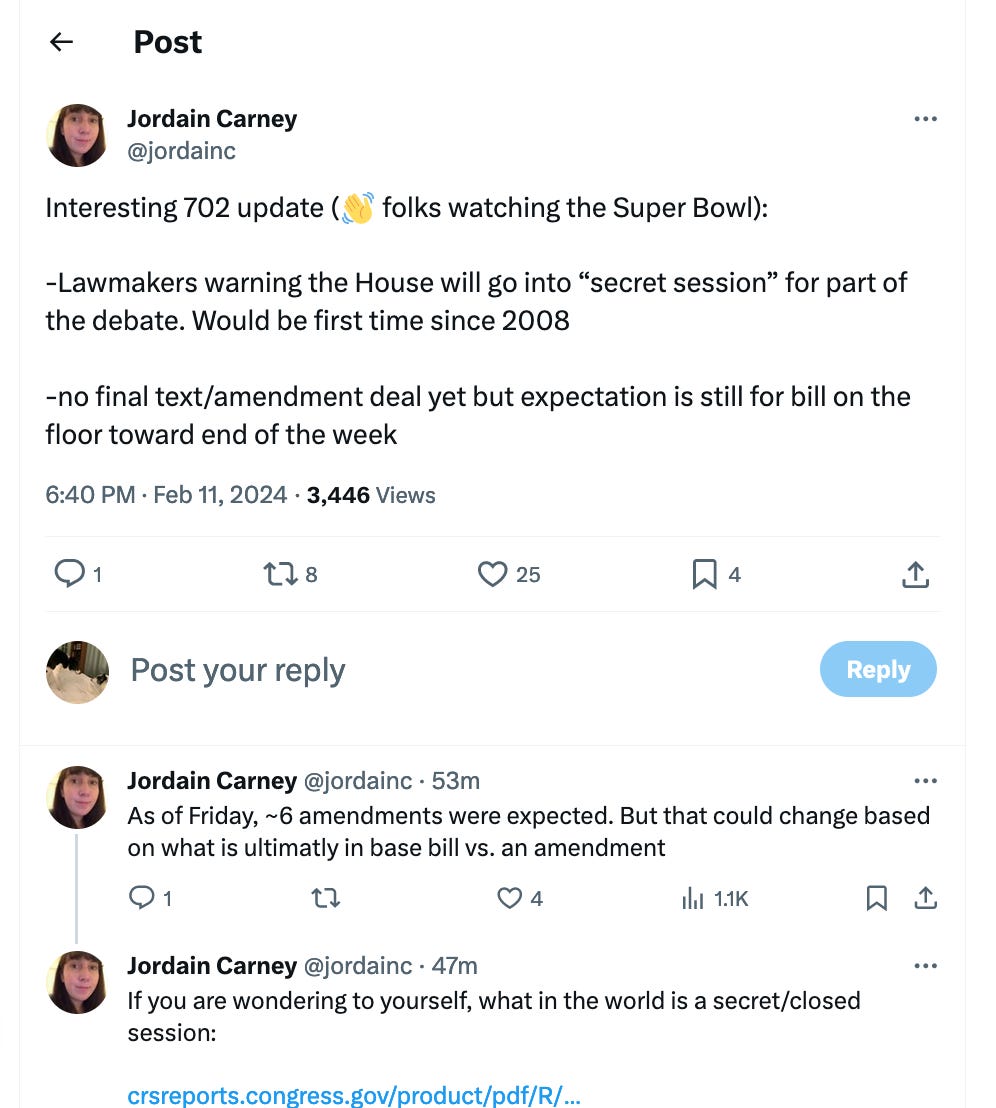Your Rights at Risk: Beware the secret Congressional FISA shell game
As early as Wednesday, Congress could take up in secret a Foreign Intelligence Surveillance Act (FISA) reform bill that may be long on surveillance and short on protecting your rights

Indeed, as early as Wednesday House Speaker Mike Johnson (R-LA) may bring a "compromise" FISA reform bill to the House floor for a vote...and according to news breaking last night, some or perhaps all of the process will take place in secret on the House floor--something that hasn't happened since 2008 and before that only three other times prior to 1830. My rule of thumb is if the House Intelligence Committee is losing a legislative battle, they will pull a stunt like this to try to fear monger Members into supporting something constitutionally violative that could never pass in open session.

If you care about your constitutional right not to have your communications intercepted and stored at will by the National Security Agency (NSA) and rifled through by the FBI without a warrant, you should consider taking some action to protect those rights. First, some necessary background.
In the wake of the New York Times revelation in December 2005 of then-President George W. Bush's illegal warrantless mass electronic surveillance program--a program initiated just hours after the 9/11 attacks and in complete violation of the FISA statute--Congress embarked on a two-and-a-half year legislative slog to make the illegal program--codenamed STELLAR WIND--ostensibly legal. The result was the FISA Amendments Act of 2008, which included in its Section VII the now-infamous Section 702 mass electronic surveillance program.
Simply stated, Section 702 allows the NSA to target the communications of non-Americans for foreign intelligence and a veritable host of other purposes. Because of the structure and data flows of the global communications system, NSA invariably sweeps up information on Americans as well through what is characterized as "incidental" collection. That data is then stored, literally for years, in databases available to NSA and FBI personnel (CIA also has access to the data but in a more restricted fashion).
And for a system that ostensibly is designed to help address foreign threats, the FBI managed to search the FISA Section 702 database for U.S. Person data no less than 3.4 million times in 2021 alone, according to FISA transparency reports made public and cited by the Privacy and Civil Liberties Oversight Board (PCLOB) in its 2023 report on the Section 702 program.
The PCLOB also found that the FBI used Section 702 data to track the activities of Black Lives Matter protesters, the First Amendment-protected protest and public demonstration activities of other civil society groups, and most ominously, run a "batch query" on a political candidate that yielded the names of 19,000 of their donors. This is the kind of activity that should be prosecuted, not tolerated.
The Justice Department and the Office of the Director of National Intelligence (ODNI) claim that those kinds of Fourth Amendment rights violations have been stopped, but fortunately nearly every member on the House Judiciary Committee didn't believe them. Instead, in December 2023, they passed on a 35-2 vote the Protect Liberty and End Warrantless Surveillance Act (H.R. 6570). The bill would require the FBI to get a warrant from a federal judge to search for information on a U.S. Person and would also ban the practice of law enforcement agencies buying information from data brokers as a way to circumvent the Fourth Amendment. It's easily the most bipartisan surveillance reform bill to move through a Congressional committee in literally decades.
Not surprisingly, the very National Security State-friendly House Permanent Select Committee on Intelligence (HPSCI)--which was created in 1978 to prevent the kind of scandal like the one involving the Section 702 program--has its own competing bill that would not solve the problems outlined above. The fight between the House Intelligence and Judiciary Committees over their competing bills was so intense in December that Speaker Johnson pulled both from floor consideration. Since then, Johnson, via Majority Leader Steve Scalise (R-LA), has been attempting to get the two committees to resolve their difference over the two bills.
There's just one problem: in this case, "resolving differences" likely means allowing the Section 702 program to operate much as it always has...which for you, me, and everyone else who relies on the global communication system means that our conversations, texts, browsing history and the like will likely still be available to the FBI without a warrant and without probable cause that a crime has been committed. However, if you want a real reform bill passed and are willing to act quickly, it may still be possible to get a good outcome here.
As a former lobbyist and long-time House staffer, I can tell you from decades of personal experience that making your voice heard absolutely matters. To that end, here are my tips and suggestions:
1. Go to the House website.
2. Look in the upper right corner of the homepage for the "Find Your Representative" section.
3. Plug in your 9-digit ZIP code (some districts straddle multiple ZIP codes, hence the need for the 9-digit version to get you the right info).
4. Once you've confirmed who your Representative is, you can make your choice as to whether you want to call their DC office or email them. You can also give them a piece of your mind on social media, but its weight of the calls and emails that most often has the greatest impact.
5. Whether you call or email, give them a simple message: Unless your Representative votes a for a FISA reform bill that 1) is considered in open session, not some secret Star Chamber-like ritual, 2) requires the FBI to get a warrant to get your records and 3) bans all law enforcement agencies from buying data from data brokers to circumvent your Fourth Amendment rights, that Representative will not get your vote come November. If you’ve got the time, think about doing a quick video on TikTok, Instagram, or Facebook with the same message, tagging your House member to make sure their communications staff sees your post.
I've already made my voice heard on this issue. I hope you will make your voice heard on it too.





